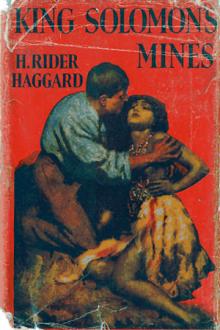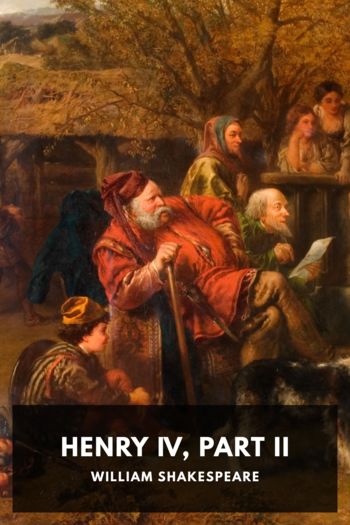King Solomon’s Mines, H. Rider Haggard [best mystery novels of all time TXT] 📗

- Author: H. Rider Haggard
Book online «King Solomon’s Mines, H. Rider Haggard [best mystery novels of all time TXT] 📗». Author H. Rider Haggard
Then I bought a beautiful team of twenty Zulu oxen, which I had kept my eye on for a year or two. Sixteen oxen is the usual number for a team, but I took four extra to allow for casualties. These Zulu cattle are small and light, not more than half the size of the Africander oxen, which are generally used for transport purposes; but they will live where the Africanders would starve, and with a moderate load can make five miles a day better going, being quicker and not so liable to become footsore. What is more, this lot were thoroughly “salted,” that is, they had worked all over South Africa, and so had become proof, comparatively speaking, against red water, which so frequently destroys whole teams of oxen when they get on to strange veldt or grass country. As for “lung sick,” which is a dreadful form of pneumonia, very prevalent in this country, they had all been inoculated against it. This is done by cutting a slit in the tail of an ox, and binding in a piece of the diseased lung of an animal which has died of the sickness. The result is that the ox sickens, takes the disease in a mild form, which causes its tail to drop off, as a rule about a foot from the root, and becomes proof against future attacks. It seems cruel to rob the animal of his tail, especially in a country where there are so many flies, but it is better to sacrifice the tail and keep the ox than to lose both tail and ox, for a tail without an ox is not much good, except to dust with. Still it does look odd to trek along behind twenty stumps, where there ought to be tails. It seems as though Nature made a trifling mistake, and stuck the stern ornaments of a lot of prize bulldogs on to the rumps of the oxen.
Next came the question of provisioning and medicines, one which required the most careful consideration, for what we had to do was to avoid lumbering the wagon, and yet to take everything absolutely necessary. Fortunately, it turned out that Good is a bit of a doctor, having at some point in his previous career managed to pass through a course of medical and surgical instruction, which he has more or less kept up. He is not, of course, qualified, but he knows more about it than many a man who can write M.D. after his name, as we found out afterwards, and he had a splendid travelling medicine chest and a set of instruments. Whilst we were at Durban he cut off a Kafir’s big toe in a way which it was a pleasure to see. But he was quite nonplussed when the Kafir, who had sat stolidly watching the operation, asked him to put on another, saying that a “white one” would do at a pinch.
There remained, when these questions were satisfactorily settled, two further important points for consideration, namely, that of arms and that of servants. As to the arms I cannot do better than put down a list of those which we finally decided on from among the ample store that Sir Henry had brought with him from England, and those which I owned. I copy it from my pocketbook, where I made the entry at the time.
“Three heavy breech-loading double-eight elephant guns, weighing about fifteen pounds each, to carry a charge of eleven drachms of black powder.” Two of these were by a well-known London firm, most excellent makers, but I do not know by whom mine, which is not so highly finished, was made. I have used it on several trips, and shot a good many elephants with it, and it has always proved a most superior weapon, thoroughly to be relied on.
“Three double-500 Expresses, constructed to stand a charge of six drachms,” sweet weapons, and admirable for medium-sized game, such as eland or sable antelope, or for men, especially in an open country and with the semi-hollow bullet.
“One double No. 12 central-fire Keeper’s shotgun, full choke both barrels.” This gun proved of the greatest service to us afterwards in shooting game for the pot.
“Three Winchester repeating rifles (not carbines), spare guns.
“Three single-action Colt’s revolvers, with the heavier, or American pattern of cartridge.”
This was our total armament, and doubtless the reader will observe that the weapons of each class were of the same make and calibre, so that the cartridges were interchangeable, a very important point. I make no apology for detailing it at length, as every experienced hunter will know how vital a proper supply of guns and ammunition is to the success of an expedition.
Now as to the men who were to go with us. After much consultation we decided that their number should be limited to five, namely, a driver, a leader, and three servants.
The driver and leader I found without much difficulty, two Zulus, named respectively Goza and Tom; but to get





Comments (0)